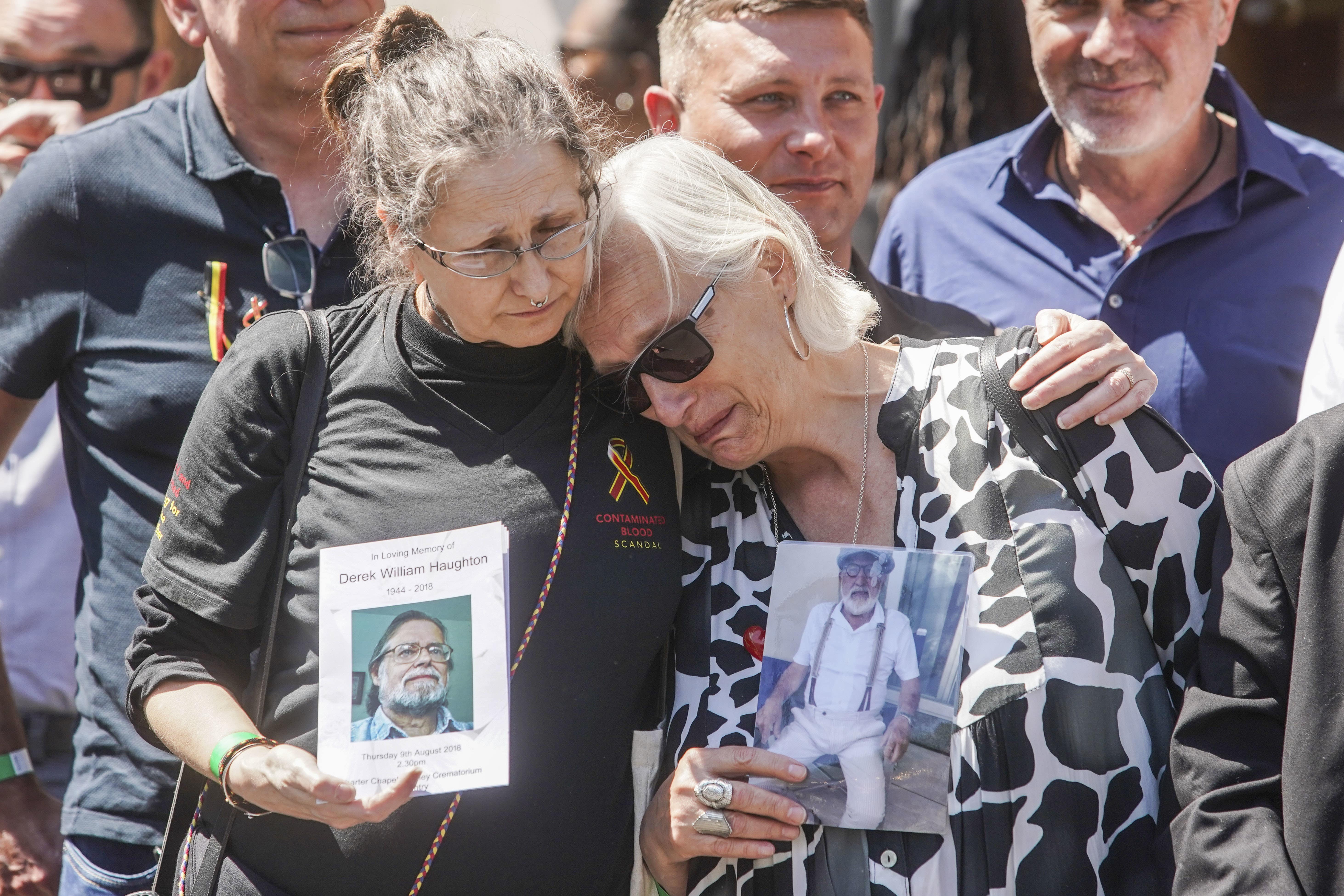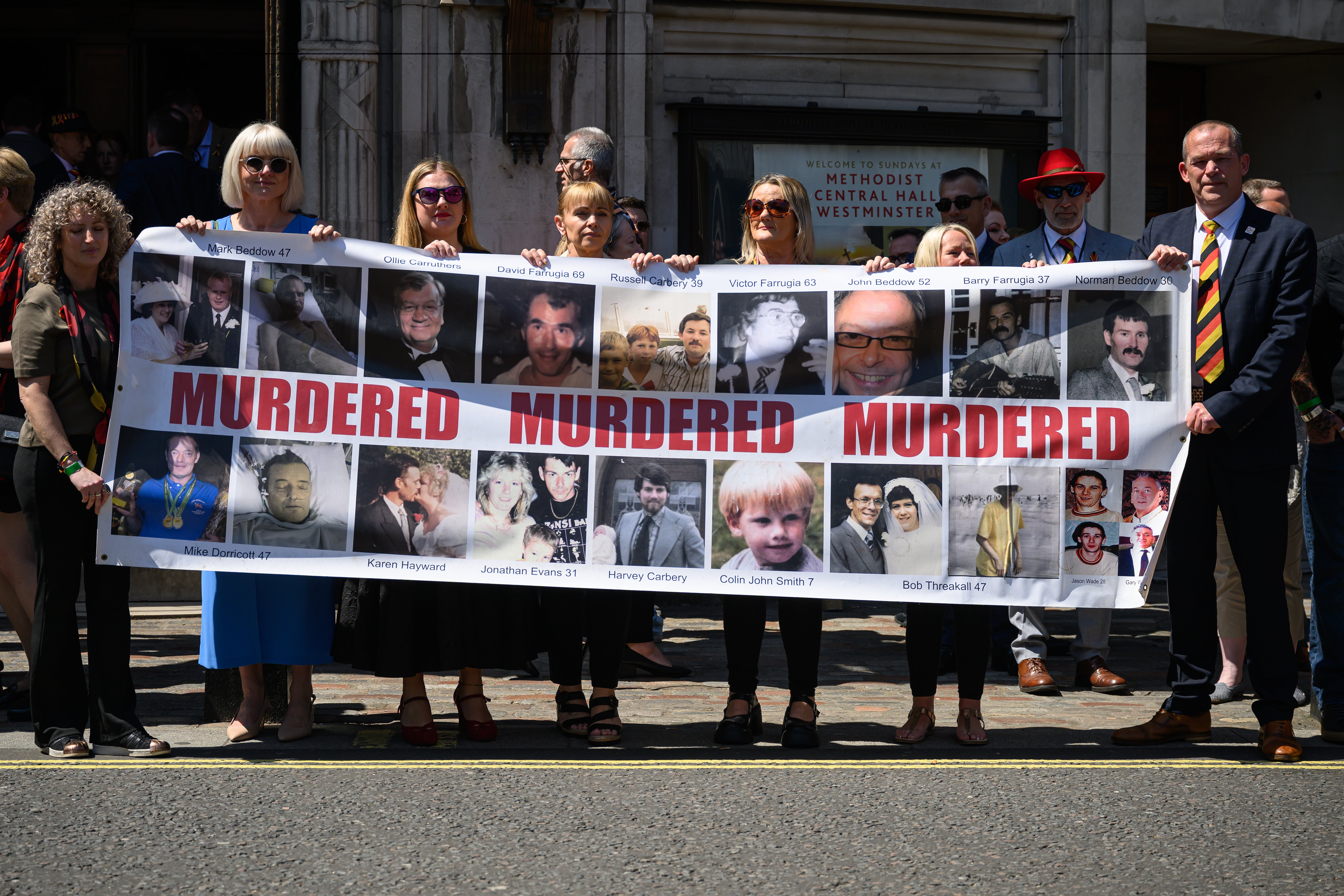Infected blood inquiry scandal - live: Sunak calls report ‘day of shame’ and vows to give victims compensation
Prime minister also apologises to victims as inquiry finds catalogue of failures by successive governments and NHS after tens of thousands avoidably infected with HIV and Hepatitis
Your support helps us to tell the story
From reproductive rights to climate change to Big Tech, The Independent is on the ground when the story is developing. Whether it's investigating the financials of Elon Musk's pro-Trump PAC or producing our latest documentary, 'The A Word', which shines a light on the American women fighting for reproductive rights, we know how important it is to parse out the facts from the messaging.
At such a critical moment in US history, we need reporters on the ground. Your donation allows us to keep sending journalists to speak to both sides of the story.
The Independent is trusted by Americans across the entire political spectrum. And unlike many other quality news outlets, we choose not to lock Americans out of our reporting and analysis with paywalls. We believe quality journalism should be available to everyone, paid for by those who can afford it.
Your support makes all the difference.The prime minister has called the findings of the inquiry into the infected blood scandal a “day of national shame”, as he pledged to give victims compensation and apologised to them on behalf of successive governments.
Addressing the House of Commons on Monday following the publication of the damning 2,527-page report, Rishi Sunak said: “I want to make a whole-hearted and unequivocal apology for this terrible injustice.”
He also promised to pay “comprehensive compensation” to those affected and infected by the scandal. “Whatever it costs to deliver this scheme, we will pay it,” he added, saying details would be set out on Tuesday.
Politicians, doctors and civil servants were found guilty of a chilling cover-up in the report, which laid bare a catalogue of failures by successive governments and the NHS that amounted to a “calamity”.
Tens of thousands of people were avoidably infected with HIV and Hepatitis in the worst treatment disaster in the history of the NHS, which led to the deaths of around 3,000 patients.
The report into the shameful scandal found the public was falsely reassured, children were treated unnecessarily, evidence was deliberately destroyed, and a significant number of people remain undiagnosed after receiving blood transfusions in the 1970s, 80s and 90s.
Some patients were “betrayed” because tests were carried out on them without their knowledge or consent.
John Glen, the Cabinet Office minister dealing with the scandal on behalf of the government, has refused to rule out criminal proceedings for those involved.
Sir Brian vows to prevent ‘unreasonable delay’ in government response to his report
Sir Brian Langstaff vowed to “do what I properly can within my powers” to prevent “unreasonable delay” in the Government response to his report.
The chairman of the probe said: “In the context of this Inquiry, perhaps beyond all other, it is unconscionable to allow a state of affairs to exist in which people’s fears that the lessons and recommendations of this Inquiry will collect dust on a Cabinet Office shelf are realised…
“It is for the Government to respond as it will, but I intend to use my position as far as I properly can to prevent unreasonable delay in its doing so.”
Sir Brian concluded his statement by saying: “It may be late, but it is not too late: now is the time, finally, for national recognition of this disaster, for proper compensation and for vindication for all those have been so terribly wronged.”
Those who remained silent should be blamed for scandal, says chair
Those responsible in the infected blood disaster should be blamed for keeping silent, Sir Brian Langstaff said as he listed his recommendations.
Where an individual is responsible for something going wrong “they should certainly be blamed if they keep silent” and be obliged to report “near misses” as well as actual wrongs, the inquiry chairman said.
Leaders in healthcare should be made subject to a statutory duty of candour, the regulatory landscape for patient safety should be “decluttered”, and the NHS should establish a safety management system, he also said.
‘Infected blood scandal left me orphaned at 9 - it tore my family apart’

‘Infected blood scandal left me orphaned at 9 - it tore my family apart’
A victim of the infected blood scandal, who was left orphaned aged nine, has recalled the devastating effects it had on her family. Lauren Palmer’s parents died within days of each other after her father, a haemophiliac, was infected with HIV and Hepatitis C during a transfusion and unknowingly passed it on to his wife. She spoke to Good Morning Britain on Monday, 20 May, as an inquiry found that politicians, doctors, and civil servants were involved in a chilling cover-up of the worst treatment disaster in the history of the health service. More than 30,000 people were infected with deadly viruses while they were receiving NHS care between the 1970s and 1990s.
Inquiry chair repeats calls for compensation for infected blood victims
The Infected Blood Inquiry chair has repeated calls for compensation for victims of the scandal.
To a round of applause from an audience at Central Hall Westminster, Sir Brian Langstaff said: “Now is the time, finally, for national recognition of this disaster, for compensation… for all those who have been so terribly wronged.”
Chancellor Jeremy Hunt on Sunday pledged to announced a compensation package worth more than £10 billion for victims.

Inquiry Chair demands government apologise to contaminated blood victims
The chair of the Infected Blood Inquiry has called on the government to apologise to victims of the contaminated blood scandal.
Speaking on stage at Central Hall Westminster to an audience of victims, he was applauded as he said: “I fully expect the government to make an apology.
“To be meaningful though that apology must explain what the apology is for. It should recognise and acknowledge not just the suffering but the fact that the suffering was due to errors, wrongs done and delays occurred. It should provide vindication for those who have waited for that for so long. And it should be accompanied by action.”
Prime Minister Rishi Sunak is expected to apologise on behalf of the government in a statement given at 5pm today.
‘Unethical and wrong’ that children’s treatment was not explained to parents
Sir Brian Langstaff said it was “unconscionable” that children at the Treloar’s school were treated in a way that “trumped safety” without the risks being explained to their parents.
He said: “Treatment choices mattered. Take the case of the haemophilia centre at Treloar’s school. Of the 122 pupils with haemophilia who attended the school between 1970 and 1987 only 30 survive.
“The pupils were often regarded as objects for research rather than first and foremost as children whose treatment should be firmly focused on their individual best interests alone.”
He added that it was “unethical and wrong” that informed consent for participation in medical trials was neither sought nor given.

Colleague of chairman of the haemophilia directors believed to be whistleblower
A colleague of Professor Arthur Bloom, who was chairman of the haemophilia directors, is thought to be a whistleblower on the infected blood scandal, according to the Inquiry chairman.
Sir Brian Langstaff said Prof Bloom, who died many years ago, “must bear some of the responsibility for the UK’s slowness in responding to the risks of Aids to people with haemophilia”.
He said the Inquiry believes one of the sources for a 1983 Mail on Sunday story headlined “Hospitals using killer blood” was “Professor Bloom’s respected senior colleague in Cardiff, who was reluctant at the time to be identified as a whistleblower”.
Prof Bloom at the time said he was unaware of any proven case in the UK and there was no need to change their treatment, Sir Brian said, adding that “disastrously the Department of Health and Social Security was over-influenced by his advice, in particular his advice to continue importing commercial factor concentrates”.
Patient’s ‘trauma compounded by lack of recognition and accountability’, says inquiry chair
Patients who were infected with contaminated blood have had their “trauma compounded by the lack of recognition of what happened to them and by a lack of accountability”, the Infected Blood Inquiry chair has said.
Sir Brian Langstaff listed three claims that have continuously been posited by authorities in response to victims’ calls for justice - that patients had the best available treatment, that infections were inadvertent, and that screening for Hepatitis C could not have been introduced earlier than September 1991.
He then refuted them all as “untrue” to a round of applause from the Central Hall Westminster audience.

Government’s reaction to Aids connection to blood products was ‘slow'
The Government was “unconscionably slow” in reacting to emerging knowledge that blood products could lead to Aids, Sir Brian Langstaff said.
He said: “A real risk that blood products transmitted the cause of Aids was known by Government by July 1982; by all haemophilia doctors by the end of 1982.
“There was already a growing epidemic in the US likely to come to these shores. Yet the response was one of denial, disbelief, dismissiveness and delay.
“The Government’s response was unconscionably slow. So too was the response of haemophilia centre directors, and of their organisation, the UKHCDO.”
Government ‘wrong’ for saying screening tests introduced as soon as technolology available
Government claims in the 1990s that screening tests for HIV and hepatitis C were introduced as soon as the technology was available were “wrong,” Sir Brian Langstaff said.
“In the case of HIV, a test had been developed by August 1984 but was not introduced for the screening of blood donations until October 1985,” the Infected Blood Inquiry chairman said.
“I have concluded that we lost months, for no clear reason, by delays and indecision when setting up a process to evaluate each available make of test. Yet a number were commercially available, and being used elsewhere in the world. Patients receiving transfusions in the UK were needlessly exposed to the risk of HIV as a result.
“In the case of Hepatitis C the delays were even worse: screening of blood donations was not introduced until September 1991. Even when a screening test was available, and approved, its use had to wait till all regions could introduce it on the same date – in other words, to go at the pace of the slowest.
“When the government claimed that screening for Hepatitis C had been introduced as soon as the technology became available, they ignored the long list of countries that introduced screening before the UK.”
Sir Brian went on to list 23 countries where screening was available before the UK.






Join our commenting forum
Join thought-provoking conversations, follow other Independent readers and see their replies
Comments